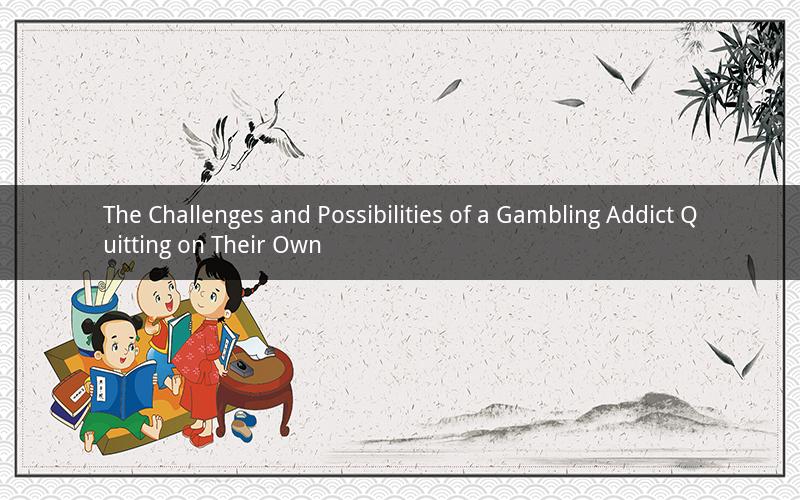
Introduction:
Gambling addiction is a complex issue that affects millions of individuals worldwide. One of the most pressing questions surrounding this addiction is whether a gambling addict can quit on their own. This article delves into the challenges and possibilities of self-quit in gambling addiction, offering insights into the psychological, social, and practical aspects involved.
I. Understanding Gambling Addiction
Gambling addiction, also known as problem gambling or compulsive gambling, is characterized by an inability to control or stop gambling despite negative consequences. It is a mental health disorder that can lead to severe financial, social, and emotional problems.
II. The Possibility of Self-Quit
While the road to recovery may seem daunting, it is possible for a gambling addict to quit on their own. However, this process is not without its challenges and requires a strong commitment to change.
A. Acknowledging the Problem
The first step in quitting gambling is to acknowledge the problem. This involves recognizing the negative consequences of gambling and the harm it has caused in various aspects of life. It is essential for the individual to take responsibility for their actions and understand the gravity of the situation.
B. Building Self-Control
Self-control is a crucial factor in overcoming gambling addiction. Developing strategies to manage impulses and avoid triggers can help an individual stay on track. This may include setting strict limits on gambling activities, seeking support from friends and family, and engaging in alternative activities to replace gambling.
C. Seeking Professional Help
While self-quit is possible, many individuals find it beneficial to seek professional help. Therapists, counselors, and support groups can provide guidance, coping strategies, and a sense of community. Professional help can also address underlying issues that contribute to gambling addiction, such as depression, anxiety, or trauma.
III. Challenges of Self-Quit
Despite the possibility of self-quit, there are several challenges that gambling addicts may face during the recovery process.
A. Psychological Challenges
Gambling addiction is often rooted in psychological factors, such as the thrill of taking risks or the need for control. Overcoming these psychological challenges can be difficult, as they may manifest in various forms, such as anxiety, depression, or paranoia.
B. Social Challenges
Gambling addiction can strain relationships with family, friends, and colleagues. Overcoming these challenges requires rebuilding trust and establishing healthy boundaries. It may also involve seeking support from others who have experienced similar struggles.
C. Financial Challenges
Gambling addiction often leads to significant financial consequences. Overcoming these challenges requires developing a budget, seeking financial counseling, and finding ways to rebuild financial stability.
IV. Success Stories
There are numerous success stories of individuals who have quit gambling on their own. These stories serve as inspiration and demonstrate the possibility of recovery.
A. Jane's Journey
Jane, a 35-year-old mother of two, realized she had a gambling addiction after maxing out her credit cards and losing thousands of dollars. She acknowledged the problem, sought support from her family, and engaged in therapy. By developing self-control and seeking professional help, Jane was able to overcome her addiction and rebuild her life.
B. Mark's Recovery
Mark, a 45-year-old business professional, discovered his gambling addiction after his wife confronted him about their financial struggles. He sought help from a therapist and joined a support group. By addressing the underlying issues contributing to his addiction and developing healthy coping mechanisms, Mark was able to quit gambling and regain control of his life.
V. Conclusion
While it is possible for a gambling addict to quit on their own, the process is not easy and requires dedication, support, and professional help. By acknowledging the problem, building self-control, seeking professional help, and addressing the challenges that arise, individuals can overcome their gambling addiction and lead a healthier, more fulfilling life.
Questions and Answers:
1. What are the signs of a gambling addiction?
Answer: Signs of a gambling addiction include losing control over gambling, lying about gambling activities, feeling remorse or guilt after gambling, prioritizing gambling over other responsibilities, and experiencing financial, social, or emotional problems due to gambling.
2. Can a gambling addict recover without professional help?
Answer: While it is possible for a gambling addict to recover without professional help, many individuals find it beneficial to seek support from therapists, counselors, and support groups. Professional help can provide valuable tools, coping strategies, and a sense of community during the recovery process.
3. How can a gambling addict build self-control?
Answer: Building self-control involves setting strict limits on gambling activities, engaging in alternative activities to replace gambling, seeking support from friends and family, and practicing mindfulness and stress management techniques.
4. What are some common triggers for a gambling addict?
Answer: Common triggers for a gambling addict include financial stress, emotional distress, social pressure, and exposure to gambling environments. Identifying and avoiding these triggers can help prevent relapse.
5. How can family and friends support a gambling addict in recovery?
Answer: Family and friends can support a gambling addict by offering empathy, understanding, and encouragement. They can also help by attending support groups, learning about gambling addiction, and providing practical assistance, such as helping with financial or legal issues.